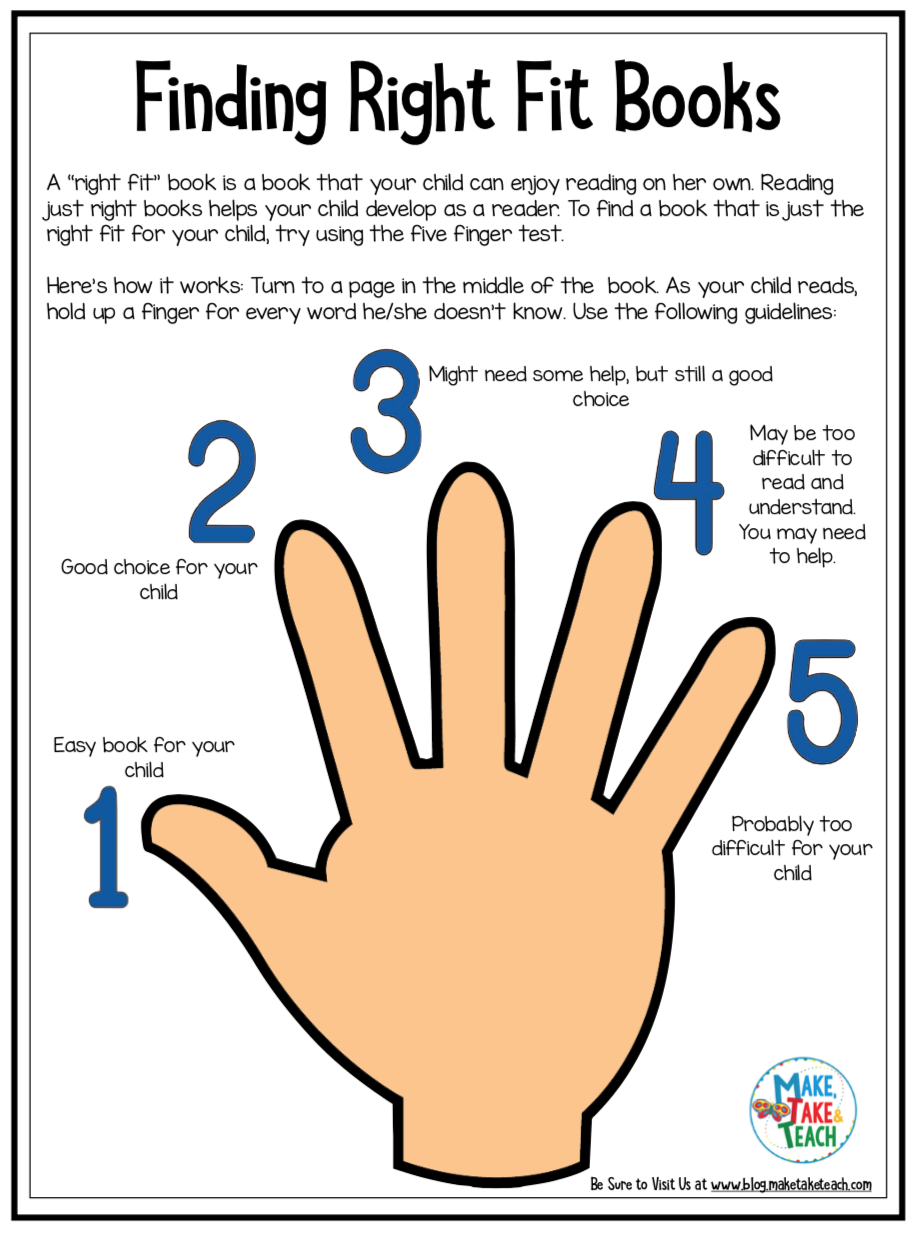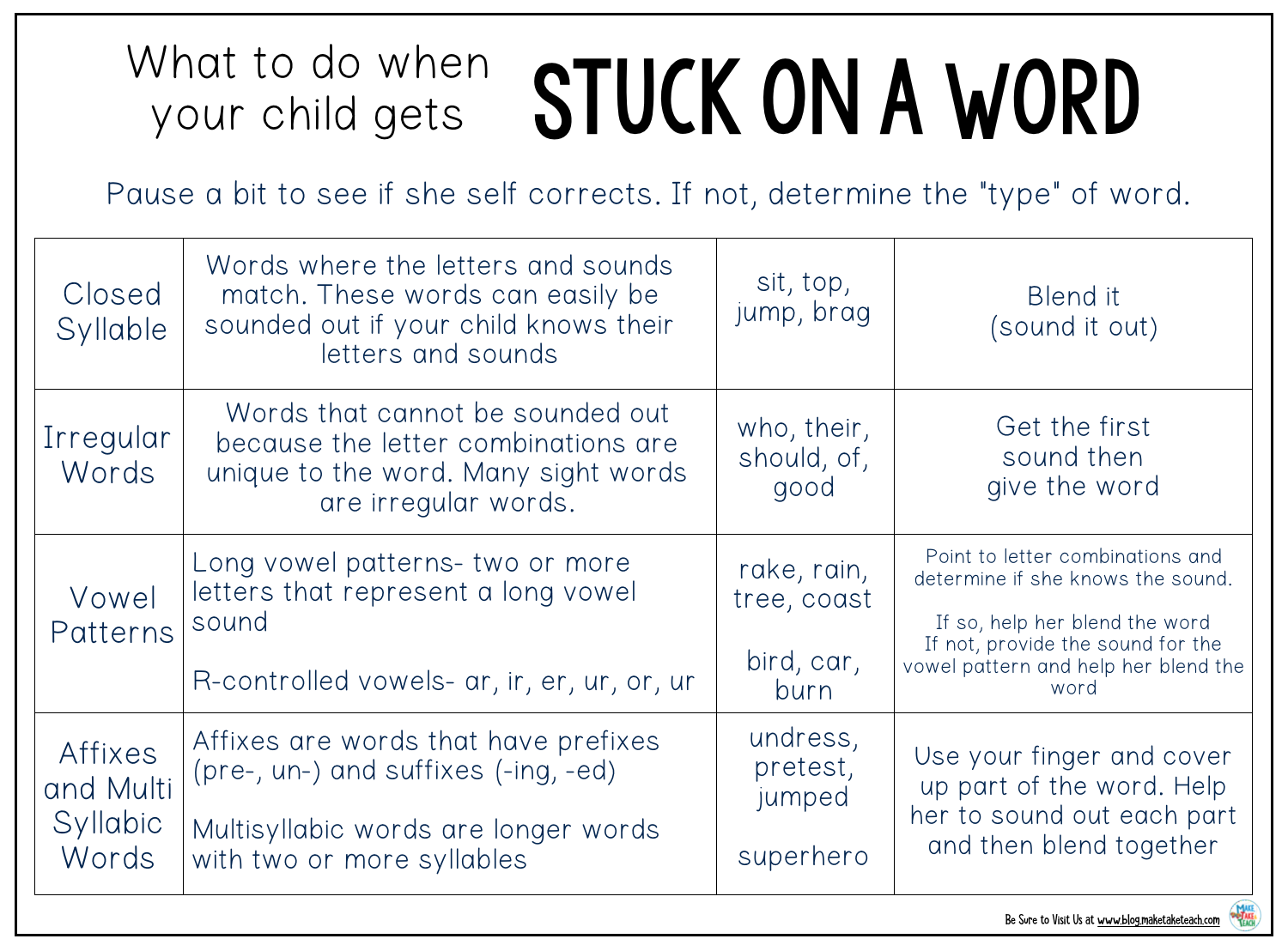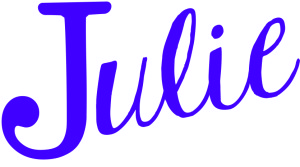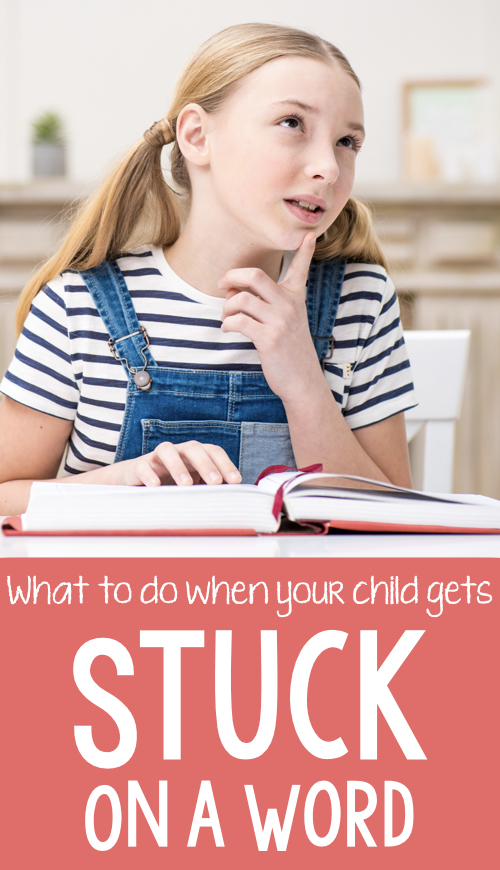
My daughter, Lizzie, is now 21 and will be graduating from college soon. Many moons ago, when she was seven, we received word from her teacher that she wasn’t where she should be in terms of reading. Unlike my other two children, Lizzie just wasn’t into reading and I have to admit, our busy life seemed to get into the way of a nightly commitment to read. Knowing the importance of reading with your child daily, we made a concerted effort to read with Liz for at least 20 minutes each night. One night as I was walking by the couch I heard my husband tell Liz to “just sound it out”. As I peeked over at the book, the book was way above her reading ability and the word that she was trying to sound out was the word “should” (not a word that can be sounded out). Both Liz and my husband were frustrated. This was an ah-ha moment for me! Not only was choosing a good fit book for a child’s reading ability not intuitive, but neither was knowing what to do when your child either gets stuck on a word or reads a word wrong. As teachers we often tell parents to just read with your child. This is great advice, but what you read and how you read is equally important and can make a difference in whether the child ends up loving to read or finds reading to be a frustrating experience.
Book Choice
Let’s talk about choosing books. The important thing to keep in mind, for many children, is that we are trying to develop a love of reading. Having your child choose a book that he or she is interested in reading is far more important than strictly sticking to a reading level. With that said, however, if your child chooses a book that is way over her reading level, the chances of her finishing the book by herself is unlikely. If your child chooses a book that is too difficult, that’s okay, put that book in the pile of books where you read together. Many children tend to choose books that are too easy for them. This is okay too. Reading books below their reading level has its advantages. Reading and re-reading books reinforces familiarity with familiar words and improves reading fluency. As it’s important for children to be read to and to read familiar text, it is also important for children to read text that is within their ability, but can be somewhat challenging. We call these books “right fit” books. Although it’s not too scientific, you can use the five finger test to determine if a book is a good fit for your child.

Feel free to download this graphic as a pdf file: Right Fit Books
After leaving the library, you may have several different types of books: books that you may be reading to your child, books that you may need to help your child read (especially if reading the first time) and books that your child can read and enjoy on her own!
Getting Stuck on a Word
So now your kiddo is reading a book that is somewhat challenging and she gets stuck on a word. Knowing what to do is important, but knowing what NOT to do is important as well. Here’s a list of Nots:
- Immediately giving her the word
- Having your child guess the word from the picture
- Having your child guess the word from the context of the story
- Telling your child that she read the word on the other page
Here’s something helpful to know. Good readers recognize words by sight. When they come to an unfamiliar word, they use spelling patterns (phonics skills) to quickly decode the word. Poor readers rely on context. Now I’m not saying that using context is always a bad thing, it’s just that most of our emphasis needs to be on helping our children use the sounds and symbols of the word to figure out unknown words. This also helps children with their spelling. We want to discourage guessing at words as this can easily become a habit.
Now here’s what to do. If your child is reading and she is stuck on a word and doesn’t move on, you need to ask yourself “what type of word is this?” What you do next will depend on the “type” of word that your child is struggling with. The best resource with how to respond to different word errors is from a powerpoint presentation from Dr. Kathleen Brown (2003). It may seem a bit complicated at first, but once you get reading with your child and thinking about the types of words she struggling with, it will begin to make sense.
Feel free to download this pdf What to do When Your Child Gets Stuck on a Word
It’s important not to get too hung up on each type of word and how to exactly respond and sometimes it’s simply okay to just provide the word for your child to keep the reading moving along. Again, the end goal is to make reading enjoyable for both you and your child. Understanding that there are different types of words and there are many words where “just sound it out” won’t work is a step in the right direction. Let’s just play out an example to see how this works. Your child is reading the sentence: They had fun playing in the rain. She gets stuck on the word “rain”. Your first step would be to look at the word “rain” and determine that the “r” makes the /r/ sound, the “ai” makes the long a vowel sound and the “n” makes the /n/ sound. So what’s probably tripping her up is the “ai”. You can now say, “let’s say the sounds we know”- /r/- (point to the ai)- “do you know what sound ‘ai’ makes?” If she doesn’t, say “‘ai’ makes the ‘a’ sound and /n/–/r/ /a/ /n/ “rain”. So that’s one scenario. Just as an FYI- although not on this chart, if a child gets stuck on a word that is a proper name that does not follow a phonics rule, I tend to just provide the word (e.g. Jose).
Now some children just read along, make errors and just keep going. Ahh! If this describes your child, you’ll want to make sure you stop her and have her figure out the words she misread. Reading accuracy is very important for comprehension so we’ll want to make sure she’s reading the words correctly. Let her get to the end of the sentence, then point to the word she misread saying something to the effect as “this word was a little tricky for you, let’s try to figure it out” and then follow the chart above. Again, if she’s making too many errors, the book should probably be moved to the “read to” or “read with” pile.
Just remember- there are so many benefits of reading with your child. There are many studies which correlate the amount of reading with increased vocabulary skills and academic achievement. With all that aside, the greatest benefit is the memories you and your child will make while discovering new adventures in books!
The post What to do When Your Child Gets Stuck on a Word appeared first on Make Take & Teach.




















